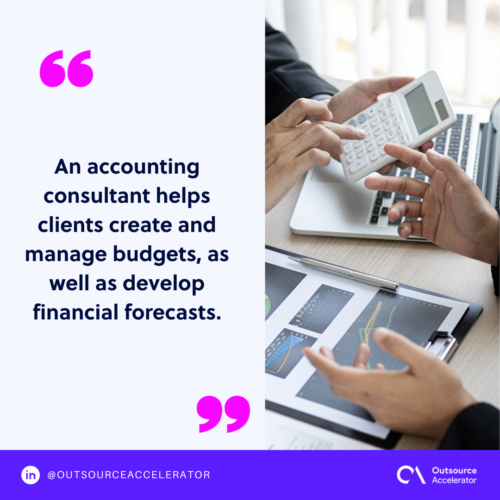The role of the accounting consultant in the workplace

Maintaining a solid financial foundation should always be a top priority for any business owner. This is where the key role of an accounting consultant becomes critical.
From providing strategic financial advice to ensuring legal compliance, accounting consultants play a pivotal role in shaping their clients’ financial health and success.
This article explores the role of an accounting consultant, examining their responsibilities, skills, and necessity in today’s business environment.
What is an accounting consultant?
An accounting consultant provides accounting services, advice, guidance, and business support.
Accounting consultants work behind the scenes, wielding their expertise to guide businesses and individuals through the intricate financial web.
They help their clients with a variety of financial matters, offering personalized services tailored to help people achieve their financial goals. This involves tax codes, financial regulations, and ever-evolving accounting standards.

Why your business needs an accounting consultant
Hiring an accounting consultant for your business can bring several benefits, including:
Expert guidance
Accounting consultants are highly knowledgeable in accounting principles, tax laws, and financial regulations.
A professional accounting consultant has the expertise to monitor and analyze your company’s financial performance.
Time and resource savings
Engaging an accounting consultant allows you to focus on your core business activities while leaving money matters to experts. This can free up your time and resources for strategic planning and growth initiatives.
Compliance
Staying compliant with tax laws and financial regulations is crucial to avoid legal issues and penalties.
An accounting consultant can ensure that your business adheres to all relevant rules and regulations, reducing the risk of costly errors.
Strategic planning
An accounting consultant can help create models for budgeting, forecasting, and evaluating scenarios to make informed business decisions. This can help you achieve sustainable growth.
Roles and responsibilities of an accounting consultant
The roles and responsibilities of an accounting consultant can vary depending on the client’s specific needs and the engagement’s scope.
However, accounting consultants typically fulfill some of the common roles and responsibilities:
Financial analysis
An accounting consultant assesses a client’s financial data, including income statements, balance sheets, and cash flow statements.
Accounting consultants analyze financial reports to identify trends, anomalies, and areas for improvement.
Bookkeeping and documentation
Accounting consultants must maintain accurate and updated financial records and documentation of their work. They should ensure transparency and compliance with regulatory requirements.
Tax planning and compliance
These accounting specialists help clients minimize their tax liabilities by developing tax strategies and ensuring compliance with tax laws and regulations. This includes identifying eligible deductions, credits, and incentives.
Financial reporting
Accounting consultants assist in preparing and presenting financial statements. They ensure that these reports accurately reflect the financial health of the organization.
Budgeting and forecasting
An accounting consultant helps clients create and manage budgets, as well as develop financial forecasts. This aids businesses in planning for the future by setting goals, monitoring performance, and making informed decisions.

Internal controls
Accounting consultants evaluate a client’s internal control systems to prevent fraud, errors, and financial mismanagement. They may recommend improvements to strengthen these controls.
Advisory and education
An accounting consultant is responsible for training and educating their clients on financial best practices, compliance, and occasionally some accounting software usage.
Accounting consultants are there to walk clients through the process of developing financial strategies that align with their business objectives.
Client relationship management
When working with accounting consultants, effective communication is crucial. They should be able to explain complex financial matters in a clear and understandable way to ensure clients are properly informed.
Skills to look for in an accounting consultant
When hiring an accounting consultant, it’s essential to consider various skills to ensure they can meet your business’s requirements effectively.
Here are key skills to look for in an accounting consultant:
- Accounting expertise. An accounting consultant should have a firm foundation in accounting principles, financial reporting standards, financial analysis, bookkeeping, tax regulations, and other relevant areas of accounting.
- Technical competence. As technology plays a significant role in accounting, proficiency with accounting software, data analytics tools, and ERP systems is advantageous.
- Analytical skills. The ability to analyze complex financial data, identify trends, and draw meaningful insights is crucial for providing valuable financial advice.
- Attention to detail. Precision is vital in accounting. Consultants must pay close attention to numbers, financial statements, and regulatory requirements to avoid errors and compliance issues.
- Communication skills. Effective communication is key for clearly explaining financial concepts and recommendations. Good listening skills are equally important.
- Problem-solving ability. Accounting consultants often encounter financial challenges and discrepancies. They should have strong problem-solving skills to devise solutions and strategies.
- Adaptability. Given the diverse needs and challenges of different clients, an accounting consultant should be adaptable, flexible, and able to handle changing circumstances.
- Time and project management. Project management skills can be valuable for complex engagements in ensuring that tasks are completed on time and within budget.
- Ethical standards. Integrity and ethical behavior are critical in accounting, as consultants often have access to sensitive financial information.
- Continuous learning. Accounting is a field that evolves. Seek an accounting consultant who invests in ongoing learning and professional development to stay current with industry trends.
Hiring an accounting consultant whose skills align with your objectives is important. The right one should possess these skills and demonstrate a commitment to understanding and serving your business’s financial goals effectively.

Salary of an accounting consultant
Salary.com records the annual salary of an accounting consultant as being within the range of $85,860 to $106,842. This can vary depending on many factors, including education, additional skills, and experience level.
Are you interested in hiring an offshore accounting consultant or any other financial role? You may read a guide about outsourced accounting services here.







 Independent
Independent




